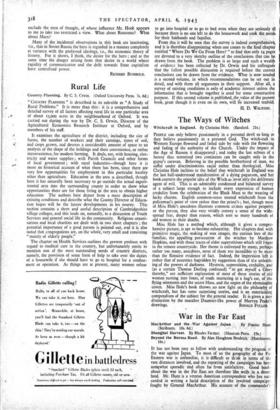The Ways of Witches
Witchcraft in England. By Christina Hole. (Batsford. 21s.)
PEOPLE can only believe passionately in a personal devil so long as they believe passionately in a personal God. The witch-cult in
Western Europe flowered and faded side by side with the flowering and fading of the authority of the Church. Under the impact of the Age of Reason it disappeared ; and today the last echoes of a heresy that terrorised two continents can be caught only in the gypsy's caravan. Believing in the possible brotherhood of man, we suffer under discriminations racial rather than theological. Miss Christina Hole inclines to the belief that witchcraft in England was the last half-understood manifestation of a dying paganism, and her book corrects the popular idea of the Witch as invar'ably the deliberate agent of evil. This is an admirably condensed and balanced survey of a subject large enough to include every expression of human credulity from the celebration of the Black Mass to the wearing of lucky charms. English common-sense treated witchcraft from the policeman's point of view rather than the priest's ; but, though most of Miss Hole's anecdotes illustrate common crimes against property or the person, they also very vividly convey a sense of the wide- spread fear, deeper than reason, which sent so many hundreds of old women to their deaths.
Miss Hole has a methot which, although it gives a compre- hensive picture, is apt to become exhausting. Her chapters deal with primitive magic, the making of wax images, the curious lore of the -familiar, the appalling persecution of the witches by Matthew Hopkins, and with those traces of older superstitions which still linger in the remote countryside. Her theme is enlivened by many, perhaps rather too many, anecdotes, most of them too incredible to be more than the flimsiest evidence of fact. Indeed, the impression left is rather that of neurotics hagridden by suggestion than of the unleash- ing of the powers of darkness. Hysteria, superstition, credulity, and (as a certain Thomas Darling confessed) " to• get myself a Glory thereby," are sufficient explanation of most of these stories of old women turning into foxes, of toads muttering in a hag's ear, of the flying ointments and the secret Mass, and the orgies of the abominable coven. Miss Hole's book throws no new light on the philsophy of witchcraft, but has some surprising stories, and is an entertaining compendium of the subject for the general reader. It is given a rare distinction by the macabre Daumier-like power of Mervyn Peake's


























 Previous page
Previous page